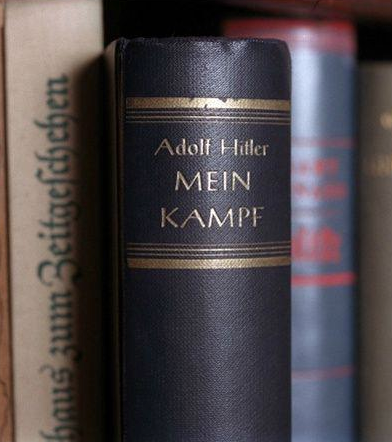Mein Kampf in schools

PRO
The German Institute of Contemporary History recently announced its decision to republish Mein Kampf, Adolf Hitler’s grotesque manifesto, in Germany for the first time since it was banned after World War II. In order to prevent the spread of misinformation, the new edition comes with annotations indicating where Hitler lied and made false claims. Nonetheless, the autobiography will expose many Germans to Hitler’s writing for the very first time. Much controversy has arisen as to whether the writing should be taught in German classrooms. But Mein Kampf must serve as a learning tool for future generations, as an open discussion is necessary for students to learn from the past, and to ban the book would be to ignore history.
Three generations have passed since the Holocaust. As the event descends into the past, preserving its memory becomes even more important. In an age of terrorism and rampant Islamophobia, everyone must recognize the unjustified prejudice that was exhibited against those who did not fit Hitler’s ideal “Aryan” standards.
“By exposing students to the book that helped influence [the Holocaust], we can broaden their understanding of the Nazi Regime,” said senior Cara Auerbach.
Moreover, the Internet ensures that students have access to copious amounts of information, regardless of whether that information is taught in the classroom or banned by German law. Educators have a responsibility to ensure that this information is not misconstrued or misinterpreted by naïve students.
Finally, the Holocaust is an important event in history. For students to truly grasp their social and political background, they must understand the events that occurred in their country during World War II.
Mein Kampf will surely contain upsetting material, but high school, which serves as a transition from adolescence to adulthood, is the time for one to leave his or her world of ignorant bliss. The Holocaust did occur, and in order to ensure that no race, religion, gender or sexuality faces the same kind of prejudice and hatred, Hitler’s words must be taught and analyzed.
CON
Only 71 years ago, the German Nazi commander Adolf Hitler was sent to his grave, along with his anti-Semitic ideas. Germany has recently decided to allow the republication of Hitler’s book and guide to Nazism, Mein Kampf, but this decision presents many issues, particularly whether or not the book should be taught in schools. One of the risks of teaching this book is that ideas from the book could possibly influence a resurgence of racial or religious hatred. One could also take offense to the slanderous anti-Semitic messages throughout the book directed toward the Jewish community.
The philosophies described in Mein Kampf are outrageously ignorant, and they may be capable of influenc some hate-fueled groups. As a persuasive speaker, Hitler was able to rally crowds to join his movement against the Jews and other minorities, even though his ideology was unjust and prejudiced. With the teaching of his book, Hitler’s words are once again being released for interpretation however the reader deems fit, and the danger of misinterpretation is still present even if analysis is done in an educational setting.
“It is scary thinking that this book might influence a rise of anti-religious or racist ideals,” said sophomore Danielle Walder.
The ideas written in Mein Kampf are also incredibly offensive to the Jewish people and contain many stereotypes and falsehoods that Hitler used to persuade people to join his anti-Semitic renegade. The words in Mein Kampf once influenced thousands of people to band against an entire religion, producing one of history’s worst genocides. Teaching Mein Kampf in school would reintroduce the philosophies that plagued the Jewish religion with years of death, ultimately ending in potential disrespect to Holocaust survivors and their descendants.
Overall, Mein Kampf should not be taught in schools because the world must be protected from the influences the book could have on hate-fueled groups. Respect also must be given to those whose families were so horrendously impacted by the Holocaust. Maintaining a ban on the printing of this book would be best in order to promote honor and freedom.
Your donation will support the student journalists of Calabasas High School. Your contribution will allow us to purchase equipment and cover our annual website hosting costs.






